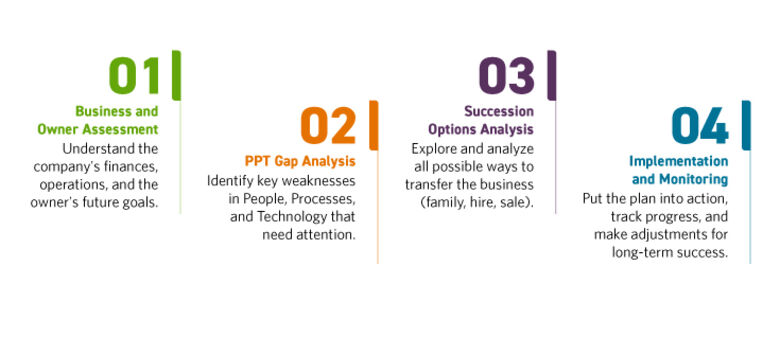Introduction: The Smith Family Dilemma
John Smith, founder and CEO of Smith Manufacturing, a successful $50 million company, faces a dilemma familiar to many business owners. At 70, he is considering retirement but is unsure how to transition his company. His son, while enthusiastic, lacks the experience John deems necessary to lead the firm. John could hire an external president, but is concerned about losing control and diluting the family legacy. Selling the business is also an option, but he worries about the impact on his employees and the community.
John's situation highlights the critical need for strategic succession planning, a process many business owners easily overlook, often with devastating consequences. Despite the pervasive "three-generation rule" myth, family businesses often exhibit remarkable staying power, a longevity that strategic succession planning is crucial in enabling.
Unlike public companies frequently driven by short-term quarterly earnings, family businesses tend to prioritize long-term survival and think in terms of generations. This long-term perspective allows them to make strategic choices that foster resilience through challenging times. Proactive succession planning is a key element of this generational mindset, ensuring a smooth and thoughtful transfer of leadership and vision to sustain the business for decades to come.
The Necessity of Strategic Succession Planning
Many business owners delay succession planning, often due to emotional attachment, a belief in their own indispensability or simply a lack of awareness of the potential consequences. The risks of inaction are substantial:
Business Discontinuity
A sudden departure of the owner without a plan can cripple operations, leading to lost revenue, customer attrition and even business failure.
Diminished Value
A poorly managed transition can significantly reduce the value of the business, impacting the owner's financial security and legacy. It is important to understand the strategies for optimal valuation.
Family Discord
Succession planning can be a source of conflict within families, especially if multiple heirs have differing interests. A lack of clear communication and a well-defined plan can exacerbate these tensions.
Missed Opportunities
Without a thorough understanding of the business's strengths and weaknesses, and policies and procedures, owners may miss opportunities to maximize their value before exiting.
Tax and Legal Implications
Improperly structured transitions can result in significant tax liabilities and legal challenges. Understanding the correct entity structure and involving strategic tax planning will assist in finding the most advantageous tax structure.
The Challenge of Generational Transitions
Beyond these general risks, family businesses face unique challenges related to generational transitions. Success requires more than just a transfer of ownership; it demands careful cultivation of future leadership, open communication with the current key stakeholders, and a willingness to adapt to changing market conditions.
Our Analytical Framework: A Holistic Approach
Effective succession planning requires a comprehensive and structured approach. Cherry Bekaert utilizes a proven framework encompassing four key stages:
1. Business & Owner Assessment
This foundational stage involves a deep dive into the current state of the business. Cherry Bekaert conducts a thorough financial analysis, operational review, market analysis and SWOT assessment. We also critically explore the owner's personal goals, including retirement planning, family dynamics, legacy desires and risk tolerance. Understanding these factors is paramount to aligning the succession plan with the owner's vision.
2. People, Process & Technology (PPT) Gap Analysis
Cherry Bekaert meticulously evaluates the company's people (skills, organizational structure, culture), processes (key workflows, documentation, risk management), and technology (systems, cybersecurity, innovation). Identifying gaps in these areas helps us understand potential vulnerabilities and opportunities related to each succession option. For example, a lack of documented processes can hinder a new leader's ability to understand and manage the business effectively.
3. Succession Options Analysis
Based on the insights gathered in the previous stages, Cherry Bekaert analyzes all viable succession options. This may include family succession, hiring an external president or selling the business. Each option is evaluated against the business's strengths and weaknesses, the owner's personal goals and the identified PPT gaps. We develop detailed scenarios outlining the potential risks and rewards of each path. In John's case, Cherry Bekaert would assess the feasibility of developing his son's business acumen, the availability of suitable external candidates and the potential value of the business in a sale.
4. Implementation & Monitoring
Once a preferred option is selected, Cherry Bekaert develops a comprehensive action plan, allocates necessary resources and oversees the implementation process. This includes collaborating with attorneys to draft legal agreements, facilitating communication among stakeholders and managing the transition. Crucially, we establish ongoing monitoring and review mechanisms so that the plan remains aligned with the evolving needs of the business and the owner.
Cherry Bekaert’s Strategic Succession Planning Framework

Succession planning is not merely a transaction; it is a strategic process that requires careful planning, objective analysis and expert guidance. By engaging in this process, business owners, like John, can secure their business legacy, protect their financial future, and provide a smooth transition for their employees and family. For family businesses especially, this planning is critical due to the added complexities of generational transitions.
How Cherry Bekaert Can Help
Cherry Bekaert specializes in guiding business owners through the complex landscape of succession planning, including the unique dynamics of family-owned businesses. We offer a comprehensive suite of services designed to address every aspect of succession planning. Our objective assessment provides an unbiased and thorough evaluation of your business and personal goals. With guidance from our experienced team of professionals, we offer advice on valuation, deal structuring, legal and tax considerations, and navigating the complexities of family dynamics.
Our team develops customized solutions tailored to your specific needs and circumstances, accounting for the unique challenges and opportunities presented by family involvement. Additionally, we facilitate communication among stakeholders for a smooth and collaborative transition process.
Cherry Bekaert also provides ongoing support and guidance to help you navigate the challenges of succession and establish the long-term success of your business. Contact our Accounting Advisory or Estate & Trust Planning teams today to learn how we can help you achieve your business succession planning goals.
Related Insights
- Podcast: Unlocking Business Potential: Strategies for Optimal Valuation
- Podcast: Strategies for Closely Held Businesses: Navigating the Exit
- Article: Understanding the Current Estate and Lifetime Gift Tax Exemption: A Guide
- Case Study: Protecting Family Assets and Future Generations with Proactive Estate Planning







